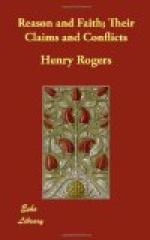Now, on the other hand, what are the chief objections which Reconcile the infidel to his enormous burden of paradoxes, and which appear to the Christian far less invincible than the paradoxes themselves? They are, especially with all modern infidelity, objections to the a priori improbability of the doctrines revealed, and of the miracles which sustain them. Now, here we come to the very distinction on which we have already insisted, and which is so much insisted on by Butler. The evidence which sustains Christianity is all such as man is competent to consider; and is precisely of the same nature as that which enters into his every-day calculations of probability; While the objections are founded entirely on our ignorance and presumption. They suppose that we know more of the modes of the divine administration—of what God may have permitted, of what is possible and impossible to the ultimate development of an imperfectly developed system, and its relations to the entire universe,—than we do or can know.* ___
* The possible implications of Christianity with distant regions of the universe, and the dim hints which hints which Scripture seems to throw out as to such implication, are beautifully treated in the 4th, 5th, and 6th of Chalmer’s ‘Astronomical Discourses;’ and we need not tell the read of Butler how much he insists upon similar considerations. ____
Of these objections the most widely felt and the most specious, especially in our day, is the assumption that miracles are an impossibility+; and yet we will venture to say that there is none more truly unphilosophical. That miracles are improbable viewed in relation to the experience of the individual or of the mass of men, is granted; for if they were not, they would, as Paley says, be no miracles; an every-day miracle is none. But that they are either impossible or so improbable that, if they were wrought, no evidence could establish them, is another matter. The first allegation involves a curious limitation of omnipotence; and the second affirms in effect, that, if God were to work a miracle, it would be our duty to disbelieve him! ___
+ It is, as we shall see, the avowed axiom of Strauss; he even acknowledges, that if it be not true, he would not think it worth while to discredit the history of the Evangelists; that is, the history must be discredited, because he has resolved that a miracle is an impossibility! ____
We repeat our firm conviction that this a priori assumption against miracles is but a vulgar illusion of one of Bacon’s idola tribus. So far from being disposed to admit the principle that a ’miracle is an impossibility,’ we shall venture on what may seem to some a paradox, but which we are convinced is a truth,—that time will come, and is coming, when even those who shall object to the evidence which sustains the Christian miracles will acknowledge that philosophy requires them to admit that men have no ground whatever to dogmatise on the antecedent




